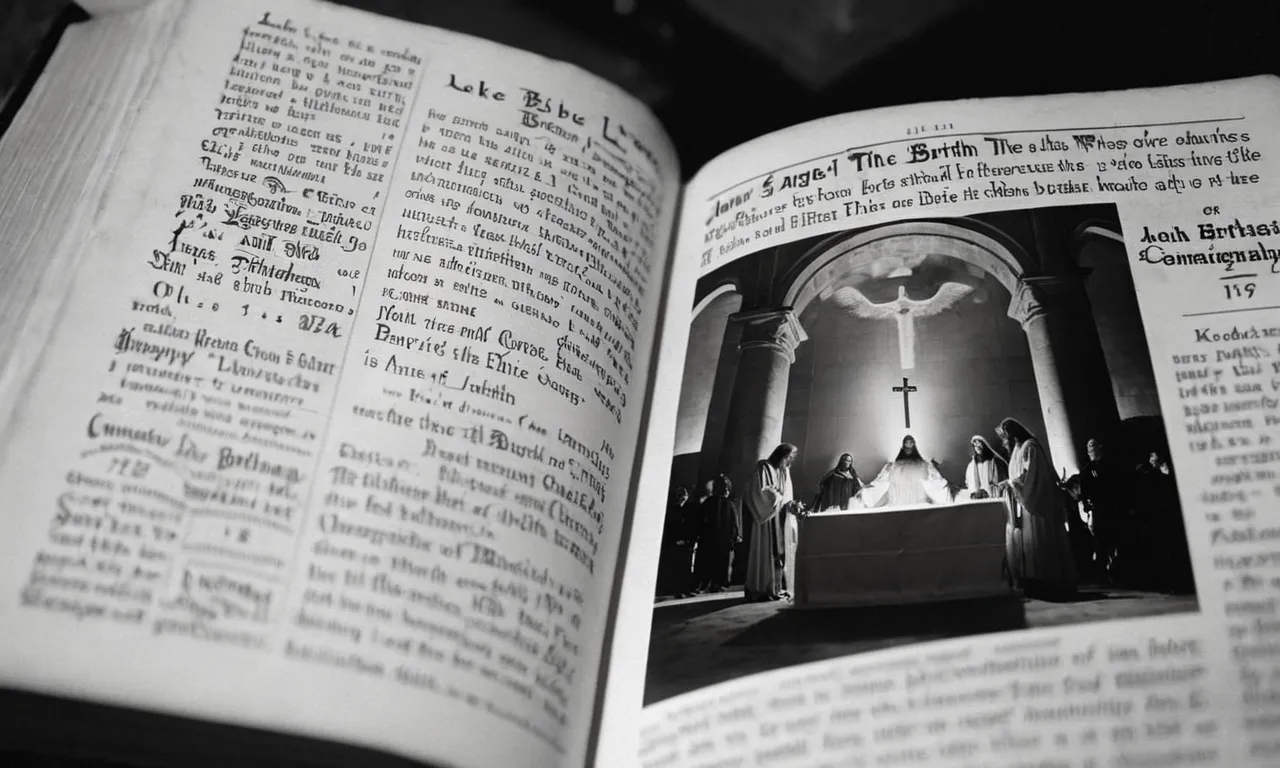What Does The Bible Say About Birthdays?
Birthdays are a beloved tradition for many people around the world. Friends and family gather to celebrate the birth of their loved one with gifts, cake, and merriment. But what does the Bible actually say about birthdays? Should Christians celebrate them or avoid them?
If you’re short on time, here’s a quick answer: The Bible does not explicitly prohibit birthday celebrations nor command them. There are only two birthdays mentioned in the Bible—Pharaoh’s and Herod’s—and both were marked by evil events.
Some Christians thus believe birthday celebrations should be avoided, while others see no issue with celebrating in moderation.
In this comprehensive article, we will examine key biblical passages about birthdays, look at the historical context around the Bible’s references, analyze early church views, and explore common positions Christians today hold regarding celebrating birthdays.
The Two Biblical Birthday Mentions
Pharaoh’s Birthday Celebration
The first mention of a birthday celebration in the Bible is found in Genesis 40:20-22, when Joseph accurately interprets the dreams of two of Pharaoh’s servants while they were in prison. When one of the servants is released and restored to his position, he remembers Joseph’s kindness and mentions him to Pharaoh.
This happens on Pharaoh’s birthday. Pharaoh decides to summon Joseph from the prison so Joseph can interpret his dreams. This leads to Joseph’s promotion as ruler over all of Egypt, second only to Pharaoh himself (Genesis 41:37-45).
While no details are given about the actual celebration, Pharaoh was holding a feast with all his servants present. This could have included a great banquet with food and drink, music and dancing, and receiving gifts befitting a king.
The political overtones of the celebration are clear – the king displayed his power and the loyalty of his servants on such occasions.
Herod’s Birthday Celebration
The second mention of a birthday in the Bible is found in Matthew 14:6-12 and Mark 6:21-29. Here, Herod is celebrating his birthday by holding a banquet for his high officials and military commanders. According to respected sources like the ESV Study Bible, Herod’s birthday likely fell on August 1st or 2nd in 31 AD. Herodias, the wife of Herod’s brother Philip, is highlighted as a key person in this account.
John the Baptist had rebuked Herod because of his unlawful marriage to Herodias, his brother’s wife while his brother was still living (Leviticus 18:16; 20:21). So Herodias nursed a grudge against John the Baptist and wanted to kill him but was unsuccessful.
Herod actually protected John because he feared him as a holy man of God.
But at Herod’s birthday banquet, Herodias persuaded her daughter Salome to dance for Herod, arousing his lust. Pleased with her, Herod offered her anything up to half his kingdom. Prompted by her mother, Salome asked for the head of John the Baptist on a platter.
Though Herod regretted the oath he made, he granted her macabre wish rather than lose face in front of his guests. So John was beheaded in prison and his head delivered to the girl during the king’s birthday feast (Matthew 14:6-11).
This somber incident reveals the corruption and excess that can happen during birthday celebrations of powerful rulers. While the people feast, indulge in revelry and receive gifts, indulging the flesh can lead to poor choices and horrific sin, as happened here.
Herod was not the kind of noble king David was, who blessed his people abundantly during his celebrations (2 Samuel 6:17-19).
Historical Context and Biblical Culture
Pagan Roots of Birthdays
The celebration of birthdays has long pagan roots, with early civilizations like Egyptians, Greeks, Romans, and Persians holding rowdy festivities to honor their gods and kings. They believed that evil spirits were especially attracted to people on their birthdays.
To protect the birthday celebrant, friends and family would surround them and make lots of noise to ward off the bad luck. This could get out of hand, with revelers becoming so inebriated they could not remember what they did.
The boisterous celebrations also included the giving of gifts to please the birthday god or king. This was done more out of fear than joy. Peasants realized their rulers had the power of life and death over them.
They hoped to appease their leaders so they would not be randomly executed or thrown in prison.
Birthdays in Ancient Times
Early Jews also were superstitious about birthdays. They considered the celebration of birthdays a part of idolatry. At pagan temples, people worshiped their gods on their birthdays by offering sacrifices. The book of Job talks about Job’s children celebrating their birthdays with parties.
Their merrymaking so concerned Job that he offered burnt offerings as atonement for their sin. (Job 1:4-5).
There are only two birthday celebrations recorded in the Bible:
- Pharaoh celebrating his own birthday (Genesis 40:20-22). This resulted in the death of Pharaoh’s baker.
- Herod celebrating his birthday by having John the Baptist beheaded (Matthew 14:6-11).
Both birthday accounts in the Bible portray God’s people being negatively affected by birthday celebrations. These stories contributed to the Jewish people’s apprehension about observing birthdays.
| Celebrant | Birthday Outcome |
|---|---|
| Pharaoh | Baker executed |
| Herod | John the Baptist beheaded |
Jewish Culture Towards Birthdays
For centuries, Jewish rabbis discouraged the celebration of birthdays. The Talmud teachers believed God judges people annually on their birthdays. To mark the day with a celebration was a form of self-praise and arrogance. Rabbis warned that parties could lead to frivolity.
It was customary for Jewish parents to fast and pray on their birthdays, contemplating their conduct over the past year and seeking forgiveness for sins.
Most Jews refrained from birthday celebrations until the 19th century when the enlightenment of Europe influenced their thinking. In America, Jewish immigrants gradually began to adopt the custom of celebrating birthdays, especially for their children.
While orthodox Jews may still avoid birthday parties for adults, reform and conservative Jews celebrate birthdays freely today.
Early Church Views on Birthdays
In the early days of Christianity, many church leaders took a dim view of birthday celebrations. Some saw them as having pagan origins and therefore unworthy of Christians. Others associated them with self-centeredness and worldly living rather than spirituality and sacrifice.
For example, around 200 AD, Origen declared: “of all the holy people in the Scriptures, no one is recorded to have kept a feast or held a great banquet on his birthday. It is only sinners like Pharaoh and Herod who make great rejoicings over the day on which they were born into this world below. “
Similarly, in the 4th century, John Chrysostom preached: “on birthdays, we ought not to be ashamed, but to glorify God, that we have passed another year, and have gone further in the path to heaven. “ He saw human existence as a preparation for the life to come rather than something to celebrate in itself.
Other church fathers like Jerome warned Christians not to observe birthdays due to perceived connections to pagan practices: “we ought not to celebrate the birthdays of the saints as though they were days of rejoicing, for they are days of mourning.”
So while Scripture does not explicitly forbid birthday celebrations, some early church leaders discouraged them due to:
- Associations with pagan festivals
- Focus on self rather than God
- Emphasis on human life over eternal life
However, these negative views were not universal. By the 4th century, some churches allowed birthday commemorations as long as they honored religious figures rather than the birthday person themselves.
Over time, the opposition to birthdays faded in most places, though some Christian groups like Jehovah’s Witnesses still discourage them today.
Modern Christian Perspectives
Against Celebrating: Jehovah’s Witnesses and Herbert W. Armstrong
Some modern Christian groups take a firm stance against celebrating birthdays. Notable examples include Jehovah’s Witnesses and followers of Herbert W. Armstrong. Their objections are based on the lack of clear biblical support for the practice.
Jehovah’s Witnesses point to two accounts of birthday celebrations in the Bible that had negative outcomes – involving the Pharaoh (Genesis 40:20-22) and King Herod (Matthew 14:6-11). They view birthday celebrations as rooted in pagan customs and therefore to be avoided by true Christians.
Similarly, Herbert W. Armstrong, founder of the Worldwide Church of God, strongly discouraged birthday celebrations. He associated such celebrations with pagan practices and argued that early Christians did not observe birthdays. He viewed self-glorification as unbiblical.
For Celebrating in Moderation: Common Evangelical View
Most evangelical Protestants today do not object to moderate birthday celebrations. They view the Genesis and Matthew accounts as descriptive rather than prescriptive – the problem was with the particular people involved, not birthdays per se.
These evangelicals point to positive portrayals of birthday celebrations in the Bible, such as in Genesis 21:8 for Isaac’s birthday. They see no clear biblical prohibition of birthdays for believers and so view celebration as a matter of individual conscience.
Many argue that birthdays appropriately honor God’s work in an individual’s life and need not be self-glorifying occasions. Moderation and reflection on using one’s life for God’s purposes are emphasized.
Other Notable Christian Positions
Christian groups have taken other perspectives on birthday celebrations through history. Early Christians made no mention of birthday celebrations prior to the 3rd century AD. But neither did they condemn the practice.
By the 4th century AD, Christians inaugurated birthday celebrations for Jesus. The Orthodox tradition continues special liturgies for Jesus’ nativity which serves as a basis for wider acceptance of birthday celebrations among Eastern Christians.
Some Protestants following Radical Reformation teachings associated birthdays with pagan astrology and divination. But their objections have not carried over into mainstream Protestantism today.
Conclusion
In the end, Scripture does not outright prohibit nor command the celebration of birthdays. There were only two birthdays mentioned, both of pagan rulers, marked by evil events.
Throughout history, many Christians have avoided celebrations with pagan roots or that venerate self. Other believers see birthdays as a harmless celebration in moderation. There are good cases to be made on both sides.
As with any personal decision for Christians, prayerfully considering biblical wisdom as well as your conscience and convictions before God is crucial. The choice is complex, but we can have unity in the Spirit however your family chooses to celebrate life’s milestones.








